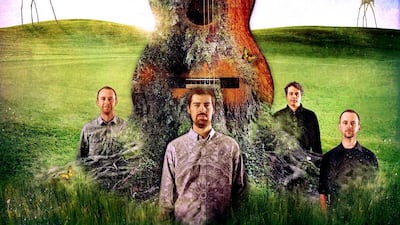Falafel, Houmous and Baba Ganoush, comedy
Check out an Edinburgh Fringe debut performance from the Egyptian stand-up comedy troupe Al Hezb El Comedy (the Comedy Party), a heady, iconoclastic mix of more than 40 Arab and English comics. Their show promises “insights into the Middle Eastern comedy scene” and to “bring Egypt back to the world comedy stage”. Preconceptions of the Middle East are pledged to be broken, with nothing extreme except the laughter.
• Stand in the Square, August 1-25
True Brits, theatre
Vinay Patel's True Brits, about how one young British Asian's life is thrown into turmoil after the 7/7 London bombings, gets its world premiere at the festival. The show, Patel's debut, is tilted more toward romance than terrorism. Patel says: "I wanted to tell a personal story that touched on notions of belonging but remained entertaining and engaging. I wanted it to revolve around a more everyday experience of growing up, about someone trying to live a normal life, that didn't delve into extremism like so many dramas around the topic."
• Assembly Hall, July 31-August 25
How War Reporting Has Changed: A Century On, discussion
Sadly, the Edinburgh International Festival – the Fringe's grown-up brother – has very little that touches on the Middle East this year. But the BBC's chief international correspondent Lyse Doucet and the BBC Middle East correspondent Orla Guerin are reflecting on how reporting has changed since the First World War. Over at the Edinburgh International Book Festival, the BBC reporter Frank Gardner, injured while reporting from Riyadh, talks about his memoir Blood and Sand.
• How War Reporting Has Changed, The Hub, August 22
• Life and Death in the Middle East with Frank Gardner, Charlotte Square, August 16
Where Do I End and You Begin, exhibition
There are many Edinburgh festivals, including the not-so-well-known, decade-old Edinburgh Art Festival, the largest UK visual-art festival, spreading across the city's many fine art galleries. Five curators and 20 artists from around the world (including Naeem Mohaiemen from Bangladesh and Masooma Syed from Pakistan) have created the Where Do I End and You Begin exhibition, the title taken from the artist Shilpa Gupta's neon sign work. It explores what we have in common – and what pulls us apart.
• City Art Centre, August 1-Oct 19
Theatre Uncut Turkey, drama
Theatre Uncut is more a movement than a performance. Leading playwrights are asked to respond to a current political situation by writing a short play about it. These plays are then made available for anyone to perform anywhere, for free. Over the past three years, they've been performed by more than 6,000 people in 19 countries. This year, Theatre Uncut has collaborated with the Istanbul company DOT Theatre to produce Theatre Uncut Turkey. Only days before the performance, it's still unclear what will happen. But it will be surprising.
• Traverse Theatre, August 4, 11 and 18
The Edinburgh Mela, music and dance festival
The liveliest of all the Edinburgh festivals is packed into just one weekend, bringing music, dance and delicious food from around the world, in particular the Indian subcontinent. You can journey around the world in 80 tunes. Sarod superstar Soumik Datta opens the carnival with his new piece King of Ghosts, combining Indian vibes with backing from the Scottish Chamber Orchestra. The master player Salim Sabri gives us qawwali – Sufi music with a 700-year legacy. There’s even a fashion show.
• Leith Links, August 29-31
The Middle East – The Unravelling of the Old Order and the Shaping of the New, book events
The Palestinian writer and lawyer Raja Shehadeh is a guest selector at this year’s Edinburgh International Book Festival, choosing authors and experts on the Middle East to look at the past, present and future of the region. Events throughout the month include Lines in the Sand, where three leading historians consider the unravelling of the Ottoman Empire and how it continues to shape the region today. There are also sessions on Syria and writers in the Middle East.
• Charlotte Square, various dates, August
Simon Thacker’s Ritmata, music
The four-piece group of the genre-defying, cross-cultural composer and guitar virtuoso Simon Thacker draw inspiration from around the world, but particularly the Middle East. Following in the footsteps of jazz greats such as John Coltrane in being influenced by Arabian music, Thacker sees his work as heavily influenced by Middle East sounds, in particular the improvisational style of taqsim.
• Summerhall, various dates between August 15-23
artslife@thenational.ae

